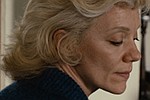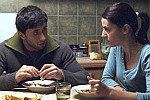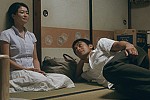 Shadows off the beaten path
Shadows off the beaten pathPOLICE, ADJECTIVE | STILL WALKING
< < F O R E I G N > >
last update 1.Mar.10
See also: SHADOWS FILM FESTIVAL
 R E V I E W B Y R I C H C L I N E
R E V I E W B Y R I C H C L I N E Apan
Apan
prd Jesper Kurlandsky
with Olle Sarri, Francoise Joyce, Sean Pietrulewicz, Niclas Gillis, Lena Carlsson, Thore Flygel, Samuel Haus, Lennart Andersson, Eva Rexed, Anders Johannisson

release Swe 23.Oct.09,
UK 12.Mar.10
09/Sweden 1h21
VENICE FILM FEST
TORONTO FILM FEST

 Tantalisingly vague, but packed with witty and sometimes harrowing observations, this artful examination of a very dark soul isn't always easy to watch. But the film's bleak chill is mesmerising.
Tantalisingly vague, but packed with witty and sometimes harrowing observations, this artful examination of a very dark soul isn't always easy to watch. But the film's bleak chill is mesmerising.
Krister (Sarri) wakes up in a pool of someone else's blood, then tries to go through his day as if nothing has happened. With his ubiquitous Bluetooth earpiece, he cycles through the city and collects his car from the garage, then heads off to his job as a driving instructor. But his temper soon gets the best of him. He keeps trying to find a sense of balance, but this internal storm of self-loathing, guilt, fear and pain is overwhelming. Even a visit with his mother (Joyce) leaves him shaken.
Yes, this is one of those minimalistic dramas in which not much seems to be happening. And indeed, Sarri's finely tuned performance is a marvel of understatement. In every scene we can see exactly what he's going through even before we understand what has happened. As the picture becomes clearer, the film takes on an unnerving complexity: we really shouldn't be able to sympathise with Krister at all, but we do.
Filmmaker Ganslandt is examining the beast within, that uncontrollable aspect of ourselves that we struggle to keep under control and then, if it gets out, leaves us to clean up the mess. The point is that all of us have the potential for both good and evil, sometimes at the same time. Life is simply not as straightforward as the movies. So Ganslandt continually surprises us with revelations, actions and reactions that we could never predict.
All of this is revealed through the murky settings, layered sound mix and close-up cinematography, finding almost unbearable intensity in the most banal situations. By the end of the film, we can see Krister's mind spinning. And it's intriguing how, even though the film focuses on him with Dardenne-style tightness, the film is still cold and dispassionate. As a result, we vividly feel Krister's utter emptiness. And also that minuscule glimmer of hope, even if no one else will ever let him have a chance for redemption.
17.Feb.10
 R E V I E W B Y R I C H C L I N E
R E V I E W B Y R I C H C L I N E La Mujer Sin Cabeza
La Mujer Sin Cabeza
prd Agustin Almodóvar, Pedro Almodóvar, Tilde Corsi, Verónica Cura, Esther García, Lucrecia Martel, Cesare Petrillo, Enrique Piñeyro, Vieri Razzini, Marianne Slot
with María Onetto, Claudia Cantero, César Bordón, Daniel Genoud, Inés Efron, Guillermo Arengo, María Vaner, Alicia Muxo, Pía Uribelarrea
 release Arg 21.Aug.08,
release Arg 21.Aug.08, US 19.Aug.09, UK 19.Feb.10
08/Argentina 1h29
CANNES FILM FEST
 There's so much going on in between the lines of this film that it can seem almost overwhelming to watch. But gifted filmmaker Martel has crafted an unnervingly internalised thriller for adventurous moviegoers.
There's so much going on in between the lines of this film that it can seem almost overwhelming to watch. But gifted filmmaker Martel has crafted an unnervingly internalised thriller for adventurous moviegoers.
When Veronica (Onetto), a respected wife and mother, hits something with her car, she starts to become disconnected from the bustling, well-heeled European society she lives in, haunted by the indigenous people living around the edges of her life. This is clearly caused by guilt, but is that due to her affair with an in-law (Genoud) or the fact that she may have killed someone. As her mental confusion grows, her husband (Bordon) and lover seem to close ranks around her to make everything right again.
Every element in this film is carefully planted to leave us clues that help us understand what is really happening. This isn't particularly easy to know, since we are seeing everything through Veronica's muddled perspective. And even in the end, it will take a bit of thought to realise what exactly we have just seen, but the effort really pays off. And Martel's challenging, involving filmmaking style is that rare thing: a movie that dares to make us work and pays off with a lingering, powerful punch.
The film is infused with a Hitchcockian sense of displaced identity, most obviously in Veronica's bleach-blonde hair, which she later dyes brown. But what this most closely resembles is Antonioni's Blow-up, with its swirling, insinuating layers of reality and perception. And then there's the heightened family melodrama, which seems to leak in from producer Almodovar. But all of this is filtered through Martel's distinct filmmaking style, which boldly stirs in the colonial South American issue.
Nothing about this movie is easy, which isn't a bad thing at all. Onetto's performance is both earthy and haunting, easily carrying us through even the most vague scenes with a deep sense of emotional connection. And the cast around her is just as raw, layering in all kinds of meaning along with the clues Martel lays out for her, all captured by Barbara Alvarez's starkly inventive cinematography. It's a staggeringly original work of cinema that wows us even as it leaves us as confounded as Veronica about the injustice we perpetuate every day.
14.Jan.10
 R E V I E W B Y R I C H C L I N E
R E V I E W B Y R I C H C L I N E Politist, Adjectiv
Politist, Adjectiv
with Dragos Bucur, Ion Stoica, Irina Saulescu, Vlad Ivanov, Radu Costin, Cosmin Selesi, Adina Dulcu, George Remes, Alexandru Sabadac, Anca Diaconu, Dan Cogalniceanu, Marian Ghenea
 release US 23.Dec.09,
release US 23.Dec.09,UK 1.Oct.09
09/Romania 1h55
CANNES FILM FEST
TORONTO FILM FEST

 Including all those dull moments that are left off-screen in other cop movies, this dry, slow-paced Romanian drama portrays the tedium of an investigation with remarkable realism, dry humour and a quietly political kick.
Including all those dull moments that are left off-screen in other cop movies, this dry, slow-paced Romanian drama portrays the tedium of an investigation with remarkable realism, dry humour and a quietly political kick.
Cristi (Bucur) is a young detective assigned to follow up on a complaint the teen Victor (Costin) made against his friend Alex (Sabadac), accusing him of selling hashish. But Cristi knows something is up, and decides to look for the suppliers instead. His superiors aren't interested in this, and want him to apply the full force of the law, even though this will mean that the essentially innocent Alex could end up in jail for four years for doing something that's not even illegal in the rest of Europe.
Shooting in long, static takes, Porimboiu catches the moment-by-moment solitude of Cristi's life, from his eventless stakeouts to the solitary dinners at home when his work clashes with the schedule of his schoolteacher wife (Saulescu). Much of the film is made up of extended scenes in which nothing much happens, but this is precisely Porimnoiu's point, and viewers need to have the patience to catch the tiny details along the way in order to understand what the film is getting at.
In other words, this is an art film for lovers of challenging cinema. But it's also a remarkably astute look at the lonely life of a jobbing cop, with the levels of bureaucracy, strained relationships and isolation from his friends. A mention of Cristi's "foot-tennis" club early on keeps us wondering what that might be, and we do eventually get a hilarious glimpse. The concluding extended scene in which he is forced to finally confront his boss, who wants him to follow the letter of the law rather than his understanding of right and wrong, packs a few terrific punches.
This is a subtle, clever film that is far too obtuse for mainstream audiences. Expert camerawork and transparent performances that don't even seem like acting make it technically proficient, as does the sparse but astute dialog. But with so little happening from scene to scene, most viewers will simply give up. Which is a shame, because the film has something powerful to say to all of us about control and legalism.
3.Jan.10
 R E V I E W B Y R I C H C L I N E
R E V I E W B Y R I C H C L I N E
prd Yoshihiro Kato, Satoshi Kono, Hijiri Taguchi, Masahiro Yasuda
with Abe Hiroshi, Natsukawa Yui, You, Kiki Kirin, Harada Yoshio, Takahashi Kazuya, Tanaka Shohei, Hayashi Ryoga, Nomoto Hotaru, Kato Haruko, Terajima Susumu

release Jpn 28.Jun.08,
US 28.Aug.09, UK 15.Jan.10
08/Japan 1h54
TORONTO FILM FEST


 With clear echoes of Ozu, this quietly effective slice of Japanese family life has a swirling undercurrent of bitterness and tension. It's also instantly recognisable to anyone who has tried to convince their parents that they're not children anymore.
With clear echoes of Ozu, this quietly effective slice of Japanese family life has a swirling undercurrent of bitterness and tension. It's also instantly recognisable to anyone who has tried to convince their parents that they're not children anymore.
On the 15th anniversary of their golden-boy son's death, Toshiko and Kyohei (Kirin and Yoshio) have a special dinner party for their surviving children. Son Ryota (Hiroshi) brings his wife (Yui) and her son (Shohei) from her late first husband. Daughter Chinami (You) brings her smiley husband (Kazuya) and their two children (Ryoga and Hotaru). But it's clear that the parents haven't moved on from their other son's death, and they can't face the fact that their other children have grown up to have lives of their own.
Shot in a gentle, unfussy style, the static camerawork sharply catches the icy relationships and cutting barbs of dialog. Filmmaker Kore-eda also builds an outrageously oppressive sense that the dead son is still very much part of the parents' lives; it's as if he died yesterday and they're still holding the wake. They also still hold a nasty resentment toward the young boy--now a grown man--their son died rescuing. But their harshest judgement is held for Ryota, who they still see as the black sheep of the family despite all evidence to the contrary.
Kore-eda captures the intense pressure of expectations with subtle insight and a warm sense of humour that's honest and edgy. From banal conversations to backhanded insults, it's what isn't said that makes the difference. And the script tellingly examines generational issues from parents to children to grandchildren, constantly surprising us with sharp details and lovely revelations about who these people really are behind the images others have of them.
This is a rich, liberating film that really captures conflicting feelings we can all identify with: the deep desire to reconnect with our family members and also the need to get away from our parents and siblings so we can be ourselves again. Even though everything seems civilised on screen, the film exquisitely observes this awkward truth with wisdom, artistry, humour and an understanding that love, respect and regret come as a package.
24.Dec.09


See also: SHADOWS FILM FESTIVAL
© 2010 by Rich Cline, Shadows
on the Wall